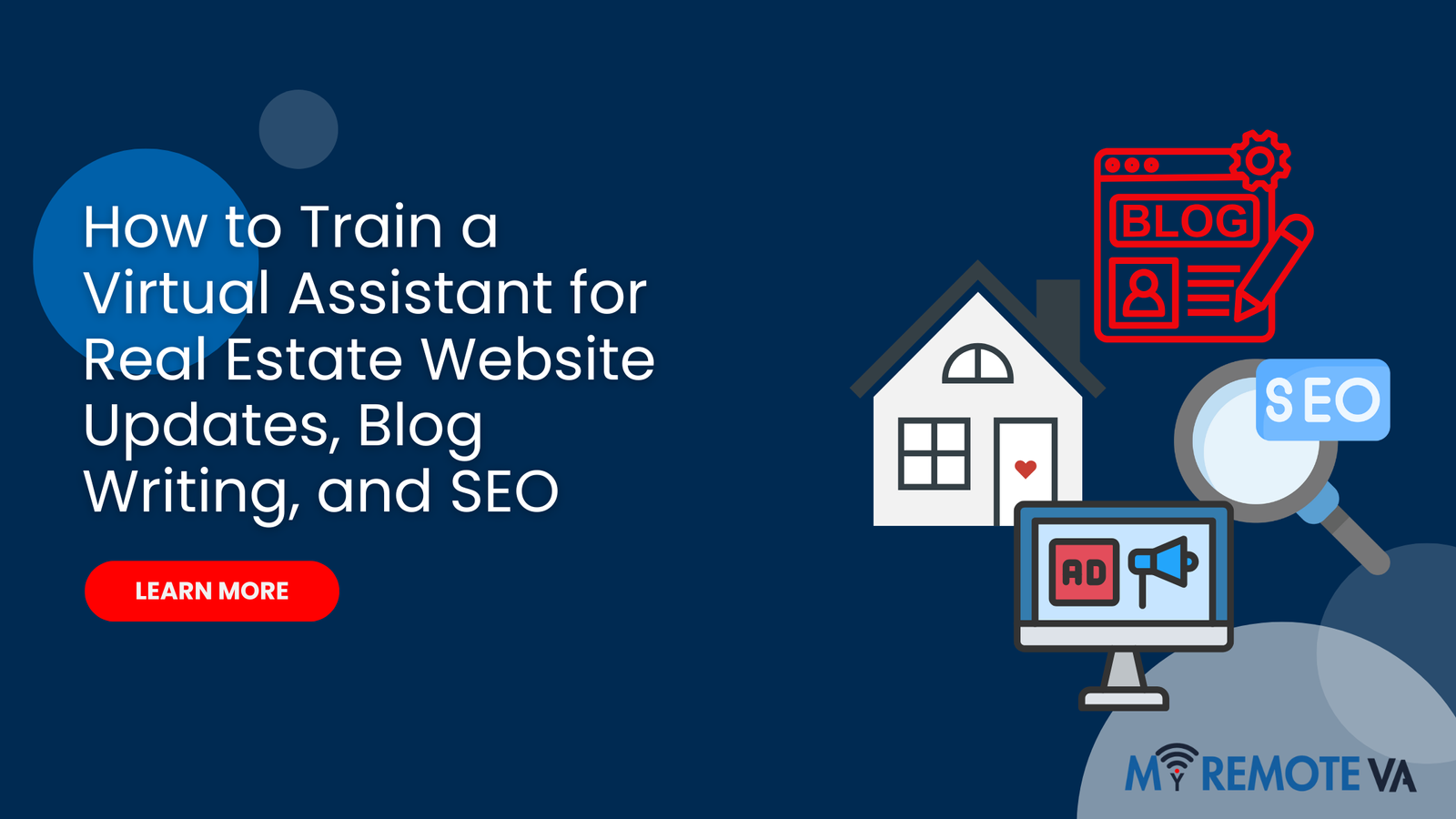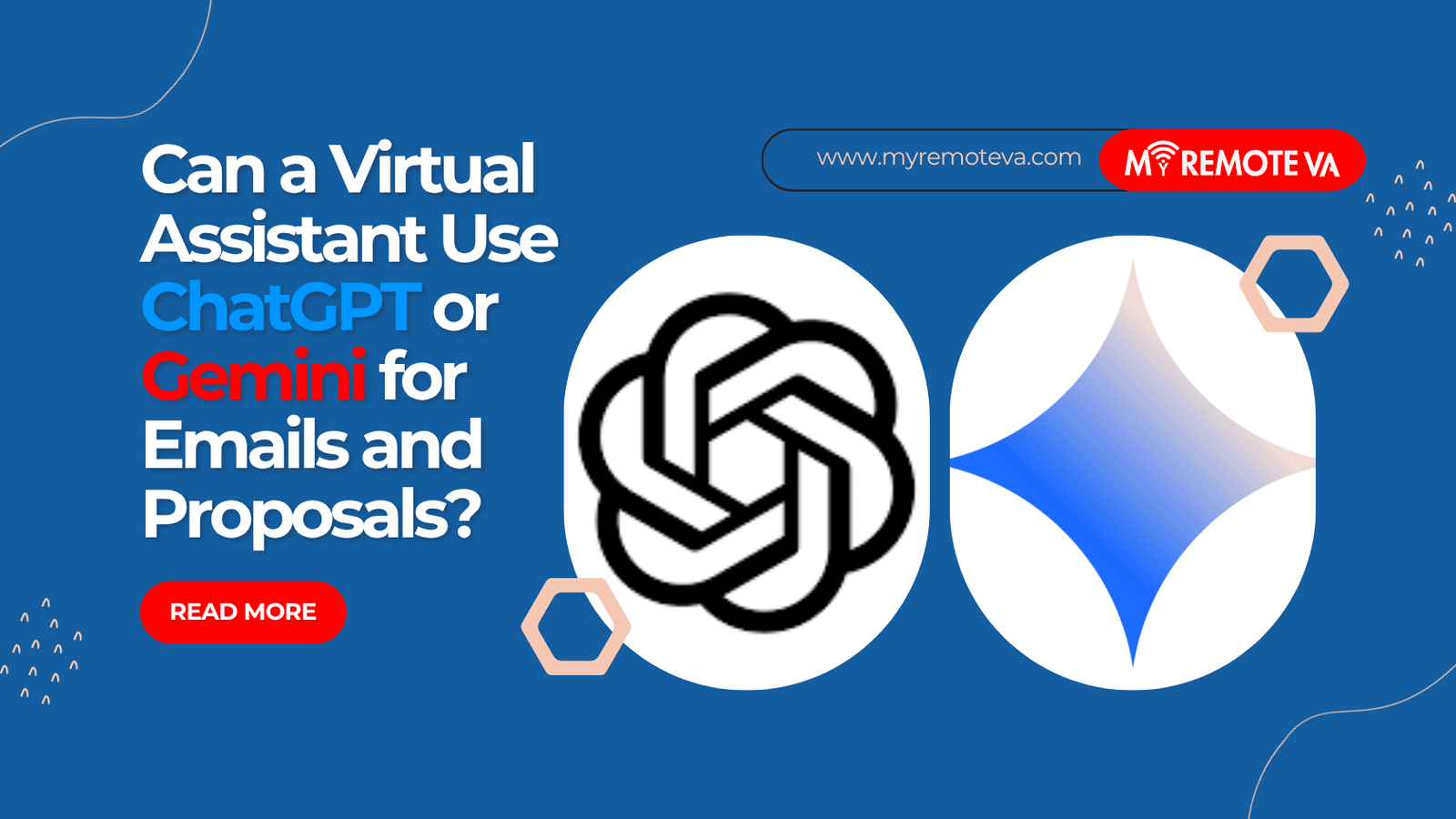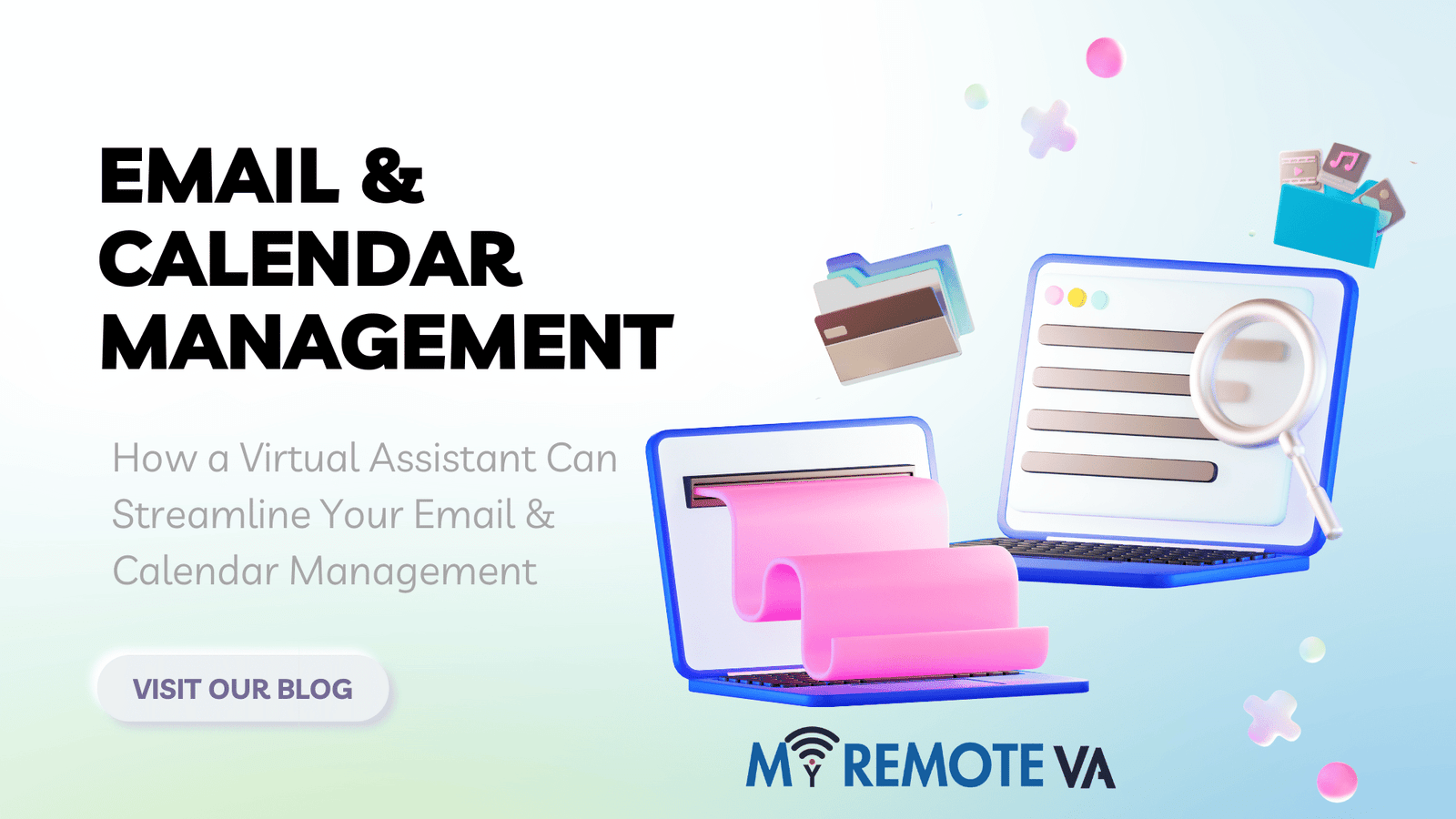How to Train a Virtual Assistant for Real Estate Website Updates, Blog Writing, and SEO
Effectively training a virtual assistant (VA) to handle your real estate website updates, blog writing, and SEO requires a structured approach. Success hinges on clear communication, well-defined processes, and ongoing feedback.
- How to Train a Virtual Assistant for Real Estate Website Updates, Blog Writing, and SEO
- I. Introduction: Why a VA is Crucial for Real Estate Success
- II. Finding the Right Virtual Assistant
- III. Training Your VA for Real Estate Website Updates
- IV. Training Your VA for Real Estate Blog Writing
- V. Training Your VA for Real Estate SEO
- VI. Ongoing Training and Communication
- VII. Tools and Resources for Training Your VA
- VIII. Common Mistakes to Avoid When Training Your Real Estate Virtual Assistant
- IX. Conclusion: Empowering Your VA for Real Estate Success
- X. FAQ
1. Onboarding and Initial Training
Begin with a comprehensive onboarding process. Even experienced VAs need to understand your specific business needs, brand guidelines, and target audience. This initial training should cover:
- Real Estate Industry Fundamentals: Provide an overview of real estate terminology, local market trends, and regulations. This helps them understand the context of their work.
- Your Brand and Style Guide: Ensure they are familiar with your brand voice, logo usage, and preferred writing style. This will maintain consistency across your website and blog.
- Website Platform Training: Provide detailed instructions on how to use your website’s content management system (CMS) for updates and content publishing. Include step-by-step tutorials and screenshots.
2. Website Updates Training
Training for website updates should encompass both technical skills and an understanding of your website’s structure. Cover these key areas:
- Content Updates: Show them how to add, edit, and format text, images, and videos. Emphasize the importance of accuracy and consistency.
- Property Listings: Provide specific guidelines for creating and updating property listings, including image requirements, descriptive text, and key features.
- Technical Aspects: Teach them basic HTML and CSS for minor styling adjustments. Explain how to optimize images for web performance .
3. Blog Writing Training
Effective real estate blog writing requires a balance of engaging content and SEO optimization. Train your VA on:
- Keyword Research: Introduce them to keyword research tools and techniques. Teach them how to identify relevant keywords for your target audience.
- Content Planning: Collaborate on a content calendar and brainstorm ideas for blog posts that address your audience’s needs and interests.
- Writing Style and Tone: Provide examples of high-performing blog posts and explain your preferred writing style. Emphasize the importance of clear, concise, and engaging language.
- SEO Best Practices: Train them on incorporating keywords naturally into the content, optimizing meta descriptions, and using headings and subheadings effectively.
4. SEO Training
SEO is crucial for driving traffic to your website and generating leads. Provide training on:
- On-Page Optimization: Teach them how to optimize website pages for search engines, including title tags, meta descriptions, header tags, and internal linking.
- Keyword Integration: Ensure they understand how to incorporate keywords strategically throughout website content and blog posts.
- Link Building Basics: Introduce them to basic link-building strategies, such as guest blogging and directory submissions. Note: Advanced link building often requires more specialized expertise.
- SEO Tools: Provide access and training on SEO tools for keyword research, rank tracking, and website analysis .
5. Ongoing Management and Feedback
Training is an ongoing process. Provide regular feedback, answer questions promptly, and monitor their work closely. This can involve:
- Regular Check-ins: Schedule regular meetings to discuss progress, address challenges, and provide guidance.
- Task Management Tools: Utilize task management software to assign tasks, track progress, and provide feedback in a structured way.
- Performance Monitoring: Track key metrics such as website traffic, blog engagement, and lead generation to assess the effectiveness of their work.
- Constructive Criticism: Provide specific and actionable feedback on their work, focusing on areas for improvement.
By investing in comprehensive training and providing ongoing support, you can empower your virtual assistant to become a valuable asset for your real estate business.
I. Introduction: Why a VA is Crucial for Real Estate Success
In today’s competitive real estate market, staying ahead requires more than just listing properties. It demands a strong online presence, consistently updated website, engaging blog content, and effective Search Engine Optimization (SEO). As a real estate professional, your time is valuable. Juggling client meetings, property showings, and negotiations often leaves little room for crucial digital marketing tasks. This is where a Virtual Assistant (VA) becomes an indispensable asset.
A well-trained VA can handle the time-consuming tasks that pull you away from your core responsibilities, allowing you to focus on what you do best: closing deals and building relationships. Delegating website updates, blog writing, and SEO management frees you to generate leads, nurture clients, and ultimately, increase your revenue.
The Power of Delegation: Website Updates and Maintenance
Your website is often the first point of contact for potential clients. It needs to be informative, user-friendly, and constantly updated with the latest property listings, market trends, and company news. A VA can ensure your website remains fresh and relevant by managing content updates, uploading new listings, and addressing technical issues.
Boosting Your Brand with Engaging Blog Content
A blog is a powerful tool for establishing yourself as a real estate expert, attracting organic traffic, and generating leads. Consistently publishing high-quality blog posts requires time and effort. A VA can research relevant topics, write engaging content, and optimize posts for search engines, helping you reach a wider audience.
Driving Traffic and Leads Through SEO
Search Engine Optimization (SEO) is essential for driving traffic to your website and increasing your visibility in search engine results pages (SERPs). A VA can conduct keyword research, optimize website content, build backlinks, and track SEO performance, helping you improve your search engine rankings and attract more qualified leads.
By entrusting these vital tasks to a skilled VA, you can reclaim your time, boost your online presence, and ultimately, achieve greater success in the real estate industry. This guide will walk you through how to effectively train a VA to support your real estate website updates, blog writing, and SEO efforts.
II. Finding the Right Virtual Assistant
Training a virtual assistant effectively starts with finding the right fit. Before you even consider training protocols, focus on identifying a VA who possesses the foundational skills and qualities required for real estate website updates, blog writing, and SEO.
A. Skills and Experience to Look For
When searching for a real estate virtual assistant, prioritize candidates with demonstrable experience in the following areas:
- Website Management: Familiarity with content management systems (CMS) like WordPress, Squarespace, or Wix is essential. They should be comfortable updating website content, images, and plugins.
- Blog Writing: Look for VAs who can produce clear, engaging, and informative blog posts related to real estate topics. A strong grasp of grammar and SEO principles is crucial.
- Search Engine Optimization (SEO): Basic SEO knowledge is a must. Ideally, your VA should understand keyword research, on-page optimization techniques, and link building strategies.
B. Qualities of a Successful Real Estate VA
Beyond specific skills, certain qualities are indicative of a VA who will thrive in this role:
- Excellent Communication: Clear and timely communication is paramount. Your VA should be responsive and able to articulate their ideas effectively.
- Attention to Detail: Real estate marketing requires meticulous attention to detail. Ensure your VA is organized and accurate.
- Proactiveness: A proactive VA will anticipate your needs and take initiative to improve your online presence.
- Adaptability: The real estate landscape and SEO best practices are constantly evolving. Your VA should be willing to learn and adapt to new technologies and strategies.
C. Different Approaches to Finding a VA
Several avenues exist for finding your perfect real estate VA. You can opt for:
- Freelance Platforms: Platforms allow you to post project-based or hourly roles and review bids from individual VAs.
- Virtual Assistant Companies: Some companies offer curated Hourly Monthly Plans with flexible task support, or build a team with Dedicated Plans with shift management and reporting.
III. Training Your VA for Real Estate Website Updates
Maintaining an up-to-date real estate website is crucial for attracting potential clients and showcasing your listings. A virtual assistant can be a valuable asset in managing this task effectively. Here’s how to train your VA for real estate website updates:
A. Platform Familiarization
Start by ensuring your VA is thoroughly familiar with the specific Content Management System (CMS) your website uses (e.g., WordPress, Squarespace, Wix). This includes:
- Navigation: Understanding the website’s backend structure and how to access different sections.
- Content Editor: Mastering the tools for creating and editing pages, posts, and media.
- Plugin Usage: If your site uses plugins for specific functionalities (e.g., IDX integration, contact forms), provide training on how to manage and configure them.
B. Content Management Protocols
Establish clear guidelines for how website content should be handled. This includes:
- Image Optimization: Training on resizing and compressing images to improve website loading speed. Large image files can significantly slow down a website, impacting user experience and SEO .
- Content Formatting: Providing templates or style guides to ensure consistency in font sizes, headings, and paragraph spacing. This creates a professional and user-friendly browsing experience.
- Accuracy and Compliance: Emphasizing the importance of verifying information before publishing and adhering to real estate advertising regulations in your area.
- Scheduling Updates: Teaching the VA how to schedule updates and posts for optimal timing and manage a content calendar.
C. Updating Listings and Property Information
This is a core task. Your VA needs to understand:
- IDX Integration: How to add, update, and remove property listings through your IDX feed. Ensure they understand how to properly categorize properties and include all relevant details.
- Property Descriptions: Provide guidelines for writing compelling and accurate property descriptions. Focus on highlighting key features and benefits for potential buyers.
- Image Galleries: Training on uploading and organizing property photos, ensuring they are high-quality and showcase the property effectively.
- Map Integration: Ensure the VA can properly embed maps and directions to property locations.
D. Testing and Quality Assurance
Before publishing any updates, your VA should thoroughly test the changes to ensure they are functioning correctly. This includes:
- Cross-Browser Compatibility: Checking how the website looks and functions on different browsers (e.g., Chrome, Firefox, Safari).
- Mobile Responsiveness: Ensuring the website is optimized for mobile devices, as a significant portion of online traffic comes from mobile users .
- Link Verification: Checking all links to ensure they are working and directing users to the correct pages. Broken links can negatively impact user experience and SEO.
Remember that consistent communication and feedback are crucial for the success of your VA. Utilizing platforms and dedicated supervisors, like those offered by some virtual assistant service providers, to manage tasks, shifts, processes, and reporting ensures smooth workflow and quality control.
IV. Training Your VA for Real Estate Blog Writing
Effective real estate blog writing requires a blend of industry knowledge, engaging storytelling, and SEO understanding. Training your VA to excel in this area is crucial for driving traffic and establishing your website as a trusted resource.
A. Establishing a Content Strategy
Start by defining your blog’s target audience and overall content strategy. What topics resonate with potential clients in your area? What are the current trends in the real estate market? Share examples of blog posts you admire and discuss why they are effective. Providing your VA with a content calendar or a list of pre-approved topics is a great starting point.
B. Real Estate Industry Knowledge
Your VA needs to understand the basics of real estate. This includes terminology, the buying/selling process, local market dynamics, and relevant laws and regulations. Provide them with resources such as:
- Industry Publications: Share links to reputable real estate news sources and blogs.
- Training Materials: Consider enrolling them in introductory real estate courses or providing access to online training modules.
- Internal Resources: Share your own knowledge and experiences through documented processes, examples, and one-on-one training sessions.
C. Writing Style and Tone
Clearly define your desired writing style and tone. Should the blog be formal and informative, or more conversational and engaging? Provide examples of your own writing or other blogs that align with your vision. Offer constructive feedback on their initial drafts, focusing on clarity, grammar, and consistency with your brand voice.
D. SEO Optimization
Blog writing for real estate is intimately linked with SEO. Train your VA on:
- Keyword Research: Teach them how to identify relevant keywords using tools and techniques.
- On-Page Optimization: Explain how to incorporate keywords naturally into titles, headings, body text, and meta descriptions.
- Internal and External Linking: Show them how to link to other relevant pages on your website and to authoritative external sources.
- Image Optimization: Explain the importance of alt text and image file size optimization for SEO.
E. Editing and Proofreading
Emphasize the importance of thorough editing and proofreading. Train your VA to use tools like Grammarly or Hemingway Editor to identify grammatical errors and improve readability. Implement a review process where you or another team member proofread each blog post before publication.
F. Providing Ongoing Feedback and Support
Consistent feedback is essential for continuous improvement. Regularly review your VA’s work, providing specific and actionable advice. Encourage them to ask questions and seek clarification. Consider using project management tools to track progress and facilitate communication.
V. Training Your VA for Real Estate SEO
SEO is critical for attracting organic traffic to your real estate website. Training your VA in SEO best practices will significantly improve your online visibility. Here’s a breakdown of how to approach this:
1. Keyword Research Training
Begin by training your VA on how to perform keyword research. This includes understanding different keyword types (e.g., informational, transactional, local), using keyword research tools, and identifying high-value, low-competition keywords relevant to your target audience. They should be able to identify keywords for specific pages or blog posts. For example, in different cities clients are looking for agents, so the VA needs to do deep keyword research to find low competitive keywords.
2. On-Page Optimization
Teach your VA the fundamentals of on-page optimization. This includes:
- Title Tags and Meta Descriptions: Writing compelling and keyword-rich title tags and meta descriptions to improve click-through rates from search results.
- Header Tags (H1-H6): Using header tags strategically to structure content and incorporate relevant keywords.
- URL Optimization: Creating search engine friendly URLs
- Image Optimization: Optimizing images with descriptive alt text and compressing them for faster loading times.
- Internal Linking: Strategically linking to relevant pages within your website to improve navigation and distribute link equity.
Explain how these elements contribute to improved search engine rankings. A well-optimized page sends strong signals to search engines about its relevance and quality.
3. Content Creation and Optimization
Your VA can play a crucial role in creating and optimizing content for your real estate website and blog. Train them on:
- Understanding Your Audience: Knowing your target audience’s needs and interests to create relevant and engaging content.
- Writing SEO-Friendly Content: Incorporating keywords naturally within the content, focusing on readability, and providing valuable information.
- Blog Writing: Developing blog posts on topics such as market trends, local neighborhoods, home buying/selling tips, and other relevant subjects.
- Content Promotion: Sharing content on social media and other platforms to increase visibility and drive traffic.
4. Local SEO
Local SEO is particularly important for real estate. Train your VA on:
- Google Business Profile (GBP) Management: Optimizing and managing your GBP profile to ensure accurate information and positive reviews.
- Local Citations: Building citations (name, address, phone number) on relevant online directories.
- Local Keyword Targeting: Focusing on local keywords in your content and on-page optimization.
5. Technical SEO
While more technical, basic understanding is valuable. Train your VA on:
- Website Speed Optimization: Identifying and addressing factors that slow down your website’s loading speed.
- Mobile-Friendliness: Ensuring your website is responsive and provides a good user experience on mobile devices.
- Schema Markup: Implementing schema markup to provide search engines with more information about your content.
6. SEO Tools and Analytics
Familiarize your VA with essential SEO tools such as Google Analytics, Google Search Console, and keyword research tools. Teach them how to:
- Track Website Traffic: Monitor website traffic trends to identify areas for improvement.
- Analyze Keyword Performance: Track the rankings of target keywords and adjust your SEO strategy accordingly.
- Identify Technical Issues: Use Google Search Console to identify and address technical SEO issues.
Data-driven insights are key to successful SEO, so encourage your VA to use these tools to inform their decisions.
VI. Ongoing Training and Communication
Effectively training your virtual assistant for real estate website updates, blog writing, and SEO requires a structured approach to ongoing learning and consistent communication. These areas are dynamic, and continuous training ensures your VA’s skills remain sharp and aligned with your business goals.
Structured Training Programs
Initial training is crucial, but don’t stop there. Consider these training methods:
- Regular Skill Development: Allocate time (e.g., 1-2 hours per week) for your VA to focus on honing their SEO, content marketing, or website management skills. This might involve online courses, webinars, or industry-specific articles.
- Platform-Specific Tutorials: Ensure your VA is proficient with the platforms you use for website management (like WordPress), SEO analysis (like Google Analytics, SEMrush), and content creation tools. Direct tutorials and hands-on exercises are key.
- SEO Best Practices Updates: SEO is constantly evolving. Provide your VA with up-to-date resources on algorithm changes, keyword research strategies, and link building techniques.
Clear Communication Channels
Open and consistent communication is vital for a successful VA partnership. This includes:
- Regular Check-Ins: Schedule weekly or bi-weekly meetings to discuss progress, challenges, and upcoming tasks. This provides opportunities to address any issues and offer feedback.
- Detailed Task Briefs: Provide clear instructions for each task, including specific goals, target keywords, style guidelines, and deadlines. The more detail, the better.
- Feedback Loops: Offer constructive feedback on your VA’s work. Be specific about what they did well and areas for improvement. Encourage them to ask questions and provide their own suggestions.
Knowledge Sharing & Documentation
Building a shared knowledge base is essential for consistency and efficiency:
- Document Processes: Create detailed documentation of your preferred workflows for website updates, blog posting, and SEO tasks. This serves as a reference guide for your VA and ensures consistency across all activities.
- Shared Resources: Maintain a shared drive or document library with templates, style guides, keyword research, and other relevant resources.
- Consistent Style and Tone: Communicate and document the desired brand voice and style guidelines for all written content. This is critical for maintaining a professional and consistent brand image.
By investing in ongoing training and fostering open communication, you can empower your virtual assistant to effectively support your real estate website, blog, and SEO efforts, ultimately driving more traffic and leads to your business.
VII. Tools and Resources for Training Your VA
Equipping your real estate VA with the right tools and resources is crucial for their success and your website’s performance. Consider these categories when building your training program:
Website Management & Content Updates
Your VA will need access to and training on your website’s Content Management System (CMS). This could be WordPress, Squarespace, or another platform. Training should cover:
- Navigation: Understanding the CMS interface and how to find specific pages or sections.
- Content Editing: Adding, editing, and formatting text, images, and videos.
- Page Building: Using page builders (e.g., Elementor, Beaver Builder) to create and modify page layouts.
- Plugin Management: Understanding how to install, activate, and configure essential plugins.
- Version Control: Understanding how to use revisions/backups to revert changes if needed.
Blog Writing & Content Creation
For blog writing, your VA will need training on your brand voice, target audience, and content strategy. Resources to consider include:
- Style Guides: Create a style guide outlining your preferred tone, grammar rules, and formatting guidelines.
- Keyword Research Tools: Provide access to tools like Google Keyword Planner, Ahrefs, or SEMrush to identify relevant keywords for blog topics.
- Content Briefs: Prepare detailed content briefs outlining the topic, target keywords, target audience, outline, and any specific requirements for each blog post.
- Grammar & Plagiarism Checkers: Utilize tools like Grammarly or ProWritingAid to ensure high-quality, original content.
- Image & Video Resources: Provide access to stock photo and video libraries (e.g., Unsplash, Pexels) and guidelines for image optimization.
SEO (Search Engine Optimization)
Effective SEO training is essential for improving your website’s visibility. Consider covering these areas:
- Keyword Research: Understanding how to identify and target relevant keywords.
- On-Page Optimization: Optimizing title tags, meta descriptions, headings, and content for target keywords.
- Link Building: Understanding link building strategies and how to acquire quality backlinks.
- Technical SEO: Understanding website structure, site speed, mobile-friendliness, and other technical factors that affect SEO.
- SEO Analytics: Using Google Analytics and Google Search Console to track website traffic, keyword rankings, and other important SEO metrics.
General Tools & Communication
Ensure your VA has access to these essential tools:
- Project Management Software: Tools like Asana, Trello, or Monday.com to track tasks, deadlines, and progress.
- Communication Platforms: Email, Slack, or other communication channels for seamless communication and collaboration.
- Screen Recording Software: Loom or similar tools for creating video tutorials and providing feedback.
- Password Management: A secure password manager (e.g., LastPass, 1Password) for sharing credentials securely.
Remember to provide ongoing support and feedback to your VA. Schedule regular check-ins to address any questions or concerns and provide guidance as needed.
Delegating effectively is key, and that is what MyRemoteVA offers to startups, founders, agencies, and busy professionals through flexible hourly and team-based plans. You can delegate admin, tech, customer support, marketing, creative tasks, or executive work. They provide a Dedicated Supervisor that manages your VA, shift, processes, and reporting so you don’t have to. You can choose from curated Hourly Monthly Plans or build a team with Dedicated Plans or multi-VA setups. If you’re not ready to commit yet, start with the Forever Free Plan, which gives you 1 free hour every month with task support and rollover benefits.
VIII. Common Mistakes to Avoid When Training Your Real Estate Virtual Assistant
Successfully training a virtual assistant for real estate website updates, blog writing, and SEO requires careful planning and execution. Avoiding common pitfalls can save you time, money, and frustration. Here are some mistakes to avoid:
Lack of Clear Communication and Expectations
One of the biggest mistakes is failing to clearly communicate your expectations. Be specific about your brand voice, target audience, desired outcomes, and preferred SEO strategies. Provide detailed instructions for website updates, including formatting guidelines, image optimization, and internal linking strategies. For blog writing, outline the topic, target keywords, desired tone, and any specific resources to consult. For SEO tasks, define your target keywords, competitor analysis procedures, and reporting requirements.
Insufficient Onboarding and Training Materials
Don’t assume your VA knows everything. Even experienced VAs will need onboarding specific to *your* business and processes. Invest time in creating training materials like:
- Website Update Guides: Step-by-step instructions with screenshots for common website updates.
- SEO Checklists: Ensure all content meets your on-page SEO standards.
- Brand Style Guides: A document outlining your brand voice, tone, and visual guidelines.
- Keyword Research Templates: Standardize your keyword research process.
- Blog Post Templates: Provides a structure and format to follow, helping them maintain consistency.
Not Providing Regular Feedback
Consistent feedback is crucial for continuous improvement. Don’t wait until a major error occurs to offer constructive criticism. Provide feedback on drafts, completed tasks, and even their approach to problem-solving. Positive reinforcement is also important; acknowledge and appreciate their efforts when they do well. Regularly scheduled check-ins allow you to address any questions or concerns and ensure they’re on the right track.
Failing to Grant Appropriate Access and Permissions
Give your VA access only to the tools and platforms they need to perform their tasks, and at the correct permission levels. Avoid giving them unnecessary access to sensitive information. Review and update access levels regularly.
Micromanaging
While clear instructions are essential, avoid micromanaging your VA. Trust them to apply their skills and knowledge. Micromanagement stifles creativity and initiative, and it prevents your VA from taking ownership of their work. Give them the space to learn and grow, and be available to answer questions and provide guidance when needed.
Ignoring Security Protocols
Especially in real estate, data security is paramount. Ensure your VA understands and adheres to strict security protocols for handling sensitive client information. This includes using secure passwords, protecting against phishing scams, and following data privacy regulations.
Not Utilizing Project Management Tools
Using project management tools like Trello, Asana, or Monday.com will help ensure tasks are tracked, completed and on time. Clear assignees, dates and deliverables is key to a successful VA relationship.
Assuming Expertise Without Verification
While your VA may possess relevant skills, always verify their expertise. Ask for examples of their previous work, conduct skill assessments, or provide a trial project to evaluate their capabilities. This ensures they have the necessary skills to meet your specific needs.
IX. Conclusion: Empowering Your VA for Real Estate Success
Successfully training a virtual assistant for your real estate website updates, blog writing, and SEO requires a strategic approach. It’s not just about delegating tasks, it’s about investing in their growth and aligning their skills with your business goals. By focusing on clear communication, structured onboarding, ongoing training, and performance monitoring, you can transform a VA into a valuable asset that significantly enhances your online presence and overall business success.
Key Takeaways for VA Empowerment:
- Start with a Solid Foundation: The initial onboarding process is crucial. Ensure your VA understands your brand, target audience, and specific requirements for website updates, blog writing, and SEO.
- Provide Continuous Learning Opportunities: The digital landscape is constantly evolving. Equip your VA with the resources and training needed to stay updated on the latest SEO trends, content marketing strategies, and website technologies. This could involve providing access to industry webinars, online courses, or internal training materials.
- Foster Open Communication: Regularly check in with your VA, provide constructive feedback, and encourage them to ask questions. This will help them learn and improve, and ensure that they are aligned with your expectations.
- Track Progress and Celebrate Success: Monitor your VA’s performance using relevant metrics (e.g., website traffic, keyword rankings, engagement on blog posts). Recognize and reward their achievements to motivate them and reinforce positive behaviors.
Remember, a well-trained and empowered virtual assistant can free up your time, allowing you to focus on core activities like client acquisition, property showings, and negotiations. This strategic investment can lead to significant growth and success in your real estate business.
Many real estate professionals find value in flexible virtual assistant plans. Options like curated Hourly Monthly Plans (e.g., 5, 10, 20, 30 hours) or Dedicated Plans (e.g., 80 or 160 hours, or multi-VA setups) can be tailored to fit various needs and budgets. Some services even offer a trial period, which can be helpful for assessing fit before committing to a longer-term plan. Choosing the right VA service and training approach is a vital step in enhancing your real estate business.
X. FAQ
How do I train a virtual assistant to support my real estate website updates?
Training a virtual assistant (VA) to handle real estate website updates effectively requires a structured approach. Start by providing clear and concise instructions on your website’s content management system (CMS). Document the processes for adding new listings, updating existing information, and troubleshooting common errors. Include screen recordings or step-by-step guides for visual learners. Regularly review their work and provide constructive feedback to ensure accuracy and consistency. Consider assigning a few simple tasks initially and gradually increase complexity as their proficiency grows.
How can I train a VA to write blog posts for my real estate website?
To train a VA in blog writing, begin by outlining your brand voice and target audience. Provide examples of successful blog posts on your site and competitors’ sites. Offer resources on real estate SEO best practices, including keyword research and on-page optimization techniques. Request the VA to create a content calendar based on relevant topics and keywords. Review drafts thoroughly, focusing on accuracy, readability, and SEO effectiveness. Encourage them to research current real estate trends and news to generate fresh and engaging content.
What’s involved in training a VA for SEO tasks?
Training a VA for SEO tasks necessitates a foundational understanding of SEO principles. This includes keyword research, link building, on-page optimization (meta descriptions, title tags, header tags), and technical SEO (site speed, mobile-friendliness). Equip them with SEO tools and train them on how to use these tools effectively. Provide them with access to analytics dashboards and explain how to interpret data to identify areas for improvement. Emphasize the importance of following Google’s Webmaster Guidelines and avoiding black-hat SEO tactics. Start with basic tasks, such as keyword research and meta description optimization, and gradually introduce more complex responsibilities.
What if I need a VA with specialized skills, like SEO or advanced website management?
You have several options. You can look for VAs with specific skill sets or you can provide training on the specific tools and techniques required. Consider virtual assistant service models that offer access to a team with diverse expertise. This can be particularly beneficial if you require assistance with a range of tasks, from administrative support to marketing and technical work. Some services provide a dedicated supervisor to manage your VA, their shift, processes, and reporting, freeing you from direct management responsibilities.
What are some common benefits of using a VA service?
Using a VA service can offer increased flexibility and scalability. You can delegate a variety of tasks, freeing up your time to focus on core business activities. Some services offer hourly or team-based plans, allowing you to scale your support as needed. This is especially valuable for startups, founders, agencies, and busy real estate professionals. You can delegate admin, tech, customer support, marketing, creative tasks, or executive work. Many services also offer a “forever free” plan with a limited number of hours per month, providing a low-risk way to test the service.











